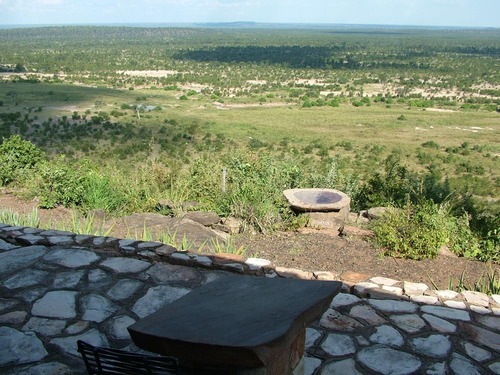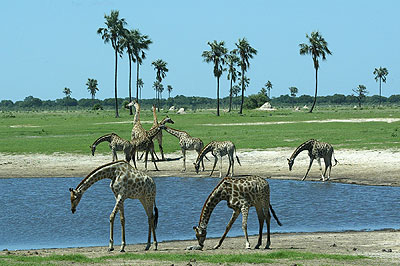Hwange National Park is located in the northwest corner of Zimbabwe just west of the main road between Bulawayo and Victoria Falls.
Size & Location: 14 000 square kilometres, Western Zimbabwe
When to visit the park: Year round
Climate: Winter - cool and dry (April to August) / Summer - hot and wet (November to March)
 ©ngoko.com
©ngoko.comHwange, the largest of Zimbabwe's National Parks, covers an area of more than 14 000 square kilometres, the size of Wales in the United Kingdom.
It was declared a Game Reserve in 1928 and through a careful management system over the years, the small wildlife nucleus has grown into large herds that now roam the game park. The National Park is estimated to have more than 40 000 elephants.
Hwange is also home to a wide range of other species, one of the most rare being the wild dog (or painted hunting dog) that through the efforts of a dedicated team of experts are once again breeding and growing in big numbers. The parks also boasts 400 bird species and 107 species of game, including the Big 5.
The magnificent sable antelope, zebra, eland, kudu and waterbuck, the bad tempered buffalo, and the tall gracious giraffe are just a few of the animals which are commonly seen on game-viewing drives.
Dawn and dusk game drives and observation platforms beside watering holes provide unforgettable scenes of the natural world in its wild state.
Lions on night patrol are a common sight around the luxury hotels and safari lodges on the National Parks perimeter.
Anytime is the right time to visit Hwange. Early in the year after the rain season the vegetation is green and lush, colorful wild flowers carpet the ground and the newly born animals cavort with their parents. It is also the same time that migratory birds start their long flights home. Later on in the year, when water is sparse the animals converge at water points providing excellent photographic opportunities.
The park has 3 camps - Hwange Main Camp, Robins Camp and Sinamatella, and there are plenty of luxury hotels and safari lodges on the borders of the park.
Hwange Main Camp is located close to the main entrance in the southern part of the park. Main Camp can easily be reached via a tarred road, off the road from Bulawayo to the Victoria Falls. Here, guests have a choice between self-catering lodges, chalets and cottages, as well as a camping and caravan site.
The self-catering lodges are en suite and have one or two bedrooms, a fully equipped kitchen and a veranda. Cooking is done in a thatched communal area, where electric hot plates are provided.
The self-catering cottages share a central communal thatched dining area. The fridges are also for communal use. Guests must provide their own cutlery and crockery.
The self-catering chalets are one or two-bedroomed units, each with a veranda. Guests make use of communal ablution facilities. Each unit is equipped with a fridge and kitchen sink, and wood or charcoal braais are provided.
The camping and caravan sites are equipped with piped water to each site, and wood or charcoal braais are available. The ablution facilities are communal.
Other facilities in Hwange Main Camp include a restaurant and bar (if you do not feel like cooking), as well as a grocery shop and fuel station. Keep in mind that petrol deliveries to Main Camp can be erratic, so plan your driving accordingly. There is also a curio shop where you can buy small gifts for the people back home.
The area around the Hwange Main Camp has many waterholes and pans, including the Ngwesha Pan and Dom waterhole. The loop road to the Ngwesha Pan is a very pleasant outing, while the Dom waterhole is famous for its beautiful sunsets. The Nyamandhlovu Platform is well-known for excellent game viewing.
 ©temba.co.za
©temba.co.za ©maplanga.co.za
©maplanga.co.zaSinamatella Camp sits atop a cliff overlooking an open vlei area and provides camping, chalets, cottages and lodges.
 ©all.travels.com
©all.travels.comRobins Camp, which lies to the west of Sinamatella, has chalets with outdoor cooking facilities, a small grocery shop, a restaurant and bar. Here you can arrange guided day and night walks with armed game scouts.
 ©4x4community.co.za
©4x4community.co.za ©e-gnu.com
©e-gnu.com ©hellotravel.com
©hellotravel.com ©animal.discovery.com
©animal.discovery.comFor reservation enquiries visit: http://www.zimparks.org/


